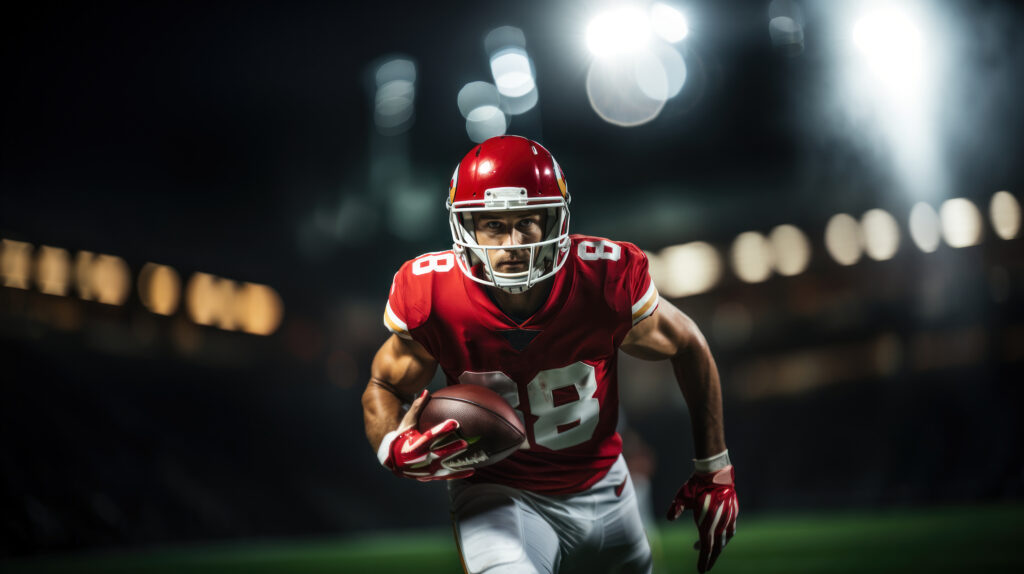When the stadium lights shine and the crowd gets loud, all eyes are on one person: the quarterback.
Every play they make happens in seconds. One wrong move can cost the game, yet the best quarterbacks stay calm, focused, and in control. We often celebrate their strength, accuracy, and ability to lead a comeback. But what truly sets great quarterbacks apart is not just their physical strength; it is their mindset. They stay calm when the pressure is high and make smart choices even when everything around them is moving fast.
Think of Tom Brady’s focus in the final minutes of a game, or Patrick Mahomes’ ability to stay creative even when things fall apart. Their success comes from training their minds as much as their bodies.
The good news? You don’t need to play football to build that kind of mental strength. The same mindset that helps quarterbacks perform under pressure can help you lead, stay calm, and make better choices in everyday life. Here are the secrets that can help you move and think like a quarterback.

Source: Freepik
1. Preparation
Quarterbacks don’t rely on good days or lucky breaks. Every decision they make during a game has already been tested through repetition and review. They spend hours studying footage to understand patterns, tendencies, and how to respond under pressure.
They don’t just memorize plays; they understand them, where each receiver will be, how a defense disguises coverage, and how pressure will change the timing of a throw. Preparation is where the real game is won. Long before kickoff, they have studied film, dissected defenses, and rehearsed hundreds of scenarios until their responses become second nature. They prepare for what could go wrong as much as for what could go right. That preparation creates a sense of calm during the game. When the pocket collapses, when the game is on the line, their decisions are the product of thousands of mental reps and disciplined habits.
That preparation builds something stronger than confidence; it builds certainty. That’s why they can stay composed when everyone else is losing focus.
Off the field, the same truth applies. Preparation turns goals into achievable plans. It’s the habit of showing up before you’re asked, learning before you’re tested, and practicing before you’re praised.
2. Calmness
Poise is one of the most overlooked traits in a quarterback. It is easy to lead when things go right; it is a whole other story when the play collapses or the scoreboard isn’t in your favor. The great ones don’t lose focus when that happens, or when the odds seem against the team. Instead, they pull their heads up high, and they stay steady.
Staying calm under pressure means being able to manage your emotions when everything around you is loud, unpredictable, and fast. A quarterback can’t afford to panic. He feels the frustration, but he doesn’t show it. He keeps his voice level in the huddle, his decisions clear, and his confidence steady.
That same poise applies beyond football. In life, you will face moments when nothing goes your way: deadlines, failures, and even the expectations of people counting on you. The ones who stay calm in those moments are the ones who lead. They don’t let emotion make their choices. They let their sense of clarity and peace guide them.
3. Confidence
Confidence is the bridge between preparation and execution. Every rep in practice, every mistake on the field, and every correction made in film study lay another brick in the foundation of preparation. You can’t fake it, and you can’t skip the process.
Every great quarterback has thrown interceptions, missed open receivers, and misread coverages. They have had games that ended in disappointment and moments where they questioned themselves. The difference is that they come back the next day and throw again. They don’t let failure define their ability; they let it refine their awareness. Over time, that resilience creates a quiet, unshakable confidence.
However, it is important to note that true confidence isn’t loud. It doesn’t need attention or approval. It is the kind that keeps a quarterback calm when the game is on the line. He doesn’t need to prove himself; he already knows what he’s capable of because he’s done the work when no one was watching. That’s why, when pressure rises, a quarterback trusts the hours he has invested.
In life, confidence works the same way. You don’t build it by waiting until you feel ready or by avoiding situations that scare you. You build it by showing up, trying, failing, and trying again. Every time you take action despite doubt, you strengthen that inner belief. Confidence is not the absence of fear; it’s the decision to move forward in spite of it.
4. Toughness
Toughness is one of the most misunderstood traits. People often think it is about never showing weakness, never flinching, or always looking unbothered. But real toughness isn’t about acting invincible; it is about staying steady when everything feels like it is falling apart.
For a quarterback, mental toughness means keeping your composure after throwing an interception, getting back up after a hard hit, and showing up the next day ready to work. It is what allows you to stay focused when the crowd turns on you, when the media questions your place, or when you have been benched after a rough stretch. If you think about it, toughness is a kind of quiet resilience. It is built in the film room, in rehab, and in the hours no one sees.
Physical talent can get you attention, but mental toughness keeps you relevant. Every great quarterback, from college to the pros, has faced adversity: bad seasons, career-threatening injuries, and moments of self-doubt. The difference between the ones who last and the ones who fade is how they respond when the game tests them. The best don’t crumble. They learn, they adjust, and they use every setback as a lesson.
In life, toughness shows up the same way. It is not about pretending nothing hurts; it is about showing up even when it does. It is holding your ground when things get uncomfortable, doing what’s right when it is unpopular, and keeping faith in your purpose when the world says otherwise. True toughness is the strength to grow through it.
5. Leadership
Leadership is the thread that ties every other trait together. You can have all the talent, confidence, and knowledge in the world. But without leadership, a team has no heartbeat. For a quarterback, leadership is about earning respect through action and consistency.
The best leaders lead quietly at first: through preparation, through discipline, through how they carry themselves. They are the first in the locker room and the last to leave. They take accountability when things go wrong and share credit when things go right. When a quarterback practices what he preaches, the team listens not because they have to, but because they want to.
True leadership shows up in the tough moments. It is easy to be confident when you’re winning; anyone can do that. Real leadership is when you have just thrown a game-ending interception and still gather your teammates to remind them, “We’ll bounce back.” It’s about keeping everyone locked in when morale dips. It is about being the calm in the storm.
Off the field, leadership looks the same. It is being the person others rely on, not because you’re the loudest, but because you are consistent, dependable, and fair. The people who lead best don’t chase titles; they set standards. They show that real influence doesn’t come from position; it comes from integrity. Whether it is in football, work, or life, leadership is about making everyone around you better just by how you show up.
6. Decision Making
If preparation is the foundation, decision-making is the execution. Quarterbacks live in a world measured in split seconds. One glance too long, one hesitation too late, and the opportunity is gone. Great quarterbacks have trained their eyes and minds to process chaos quickly and make the right call under pressure.
Every snap presents choices: take the deep shot or check it down, stay in the pocket or scramble, trust the route or audible out. The best decision-makers are decisive, not what you call perfect. They know when to make a decision and stick by it. They commit fully, even knowing not every choice will be right. That decisiveness keeps momentum alive and earns the trust of the team.
Decision-making goes beyond processing information. It is taking control of your emotions, staying level when adrenaline is spiking and noise is everywhere, and learning from mistakes without letting them define you. A quarterback who hesitates loses time; a leader who hesitates loses trust.
In life, decision-making carries the same weight. It is about taking responsibility for your choices, learning from the outcomes, and moving forward with purpose. The key is to decide without fear because progress always favors those willing to make a move.
Takeaway
A quarterback’s greatness isn’t measured only by touchdowns or stats. It is measured by how he thinks, reacts, and leads when everything is on the line. The same holds true in life. The skills that make a great quarterback: poise, confidence, toughness, preparation, and leadership, are the same qualities that define strong individuals in any field.
Pressure will always exist. Mistakes will happen. But those who prepare, stay composed, and keep moving forward are the ones who win, on the field and beyond it. The real lesson is that success doesn’t come from talent alone; it comes from mindset, consistency, and the courage to lead through adversity.
Want to see how your mindset measures up? Take our mental game quiz to find out how you’d perform under pressure, and discover which quarterback trait you naturally excel at.






